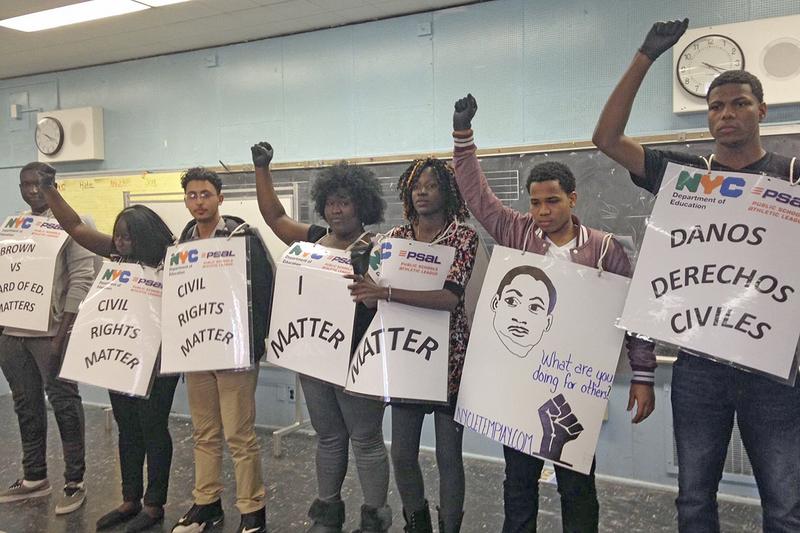 SchoolBook
SchoolBook
Students Claim City Sports Program Discriminates Against Small Schools

When Hassanatou Samake moved to the Bronx from Mali in 2013, she made sure her new high school had a soccer team. Soon, she was playing offense for a co-ed team called the Lions at International Community High School, which has new arrivals from all over the world.
“It felt good 'cause when I was in Mali I used to play every day with my school team,” said the lanky 20-year-old.
Samake, who's graduating in June, was hoping to play soccer again starting this month. But there will be no soccer this spring at International Community. “We are not important in their eyes,” Samake said, referring to the Department of Education.
Despite winning more money for sports in this year’s budget, some small high schools actually wound up with fewer teams because of quirks in how the Public Schools Athletic League (PSAL) distributes its resources.
That funding system disproportionately hurts black and Latino students because they are heavily concentrated in small schools, said David Garcia-Rosen, a dean of International Community and lead organizer of the advocacy group NYCLetEmPlay.
“Thirty-eight thousand students of color are in a D.O.E. high school today with no sports in the spring,” he said, adding that sports encourage struggling students to come to school.
About 50 of Garcia-Rosen’s students protested on Wednesday at a City Council education committee budget hearing, chanting “Students’ lives matter.” They were escorted out of the chambers. Garcia-Rosen and anther staffer were then reassigned from their school on Thursday. The Department of Education cited an investigation of misconduct, which appears related to the protest.
Department spokesman Jason Fink would not elaborate but he said the agency is committed to providing athletic opportunities to all students.
“This is an important issue and the D.O.E. is working hard to increase athletic opportunities at small high schools by adding 109 new teams this year that will support nearly 2,000 roster spots on a diverse array of boys, girls and co-ed teams," he said in a statement.
Top officials from the PSAL also met with International Community students, but the students weren't satisfied and are planning more protests.
Small schools have complained for years about being shut out of the big league, PSAL. While some are located in former large high school buildings, others were placed in elementary and middle schools or even office buildings that didn’t have sports facilities.
Garcia-Rosen created the Small Schools Athletic League in 2011 to provide more opportunities. Principals used money for staff and got parks department permits for fields. But he said they still never had as many teams on average as larger schools like Tottenville in Staten Island and James Madison in Brooklyn, many of which also have more white students.
Of course, the big schools have more students. But Garcia-Rosen said it’s a question of equitable opportunities. “We understand students in a 400-student high school can’t have 44 teams,” he said, before his removal from school. “But they can have access through a community-based high school sports program.”
Last year, the City Council added $825,000 to the Department of Education’s budget to help the small schools’ teams. Their league was folded into PSAL. But with the change in management, some small schools wound up being ineligible for teams because they have over-age students, in violation of PSAL rules, and because the state canceled co-ed soccer. Others applied for teams and didn’t get them.
Mark Dorman, Athletic Director and Physical Eduction teacher of Manhattan Comprehensive Night and Day High School, said his school lost a boys soccer program that served 45 students.
In the Bronx, International Community High School also lost its baseball team, which won the Small Schools Athletic League title two years in a row. The Department said the school didn’t get a team this year because it chose to apply through a program for over-age students, and therefore doesn’t qualify for baseball.
Garcia-Rosen said the Small Schools Athletic League provided more flexibility for schools with non-traditional students like his, and he said he hoped the city would do the "moral" thing.
Meanwhile, he filed a complaint with the U.S. Departments of Education and Justice accusing the city of violating Title VI of the 1964 Civil Rights Act by depriving blacks and Latinos with equitable access to after-school sports. This year the city was found in violation of Title IX by not providing enough sports opportunities for girls.